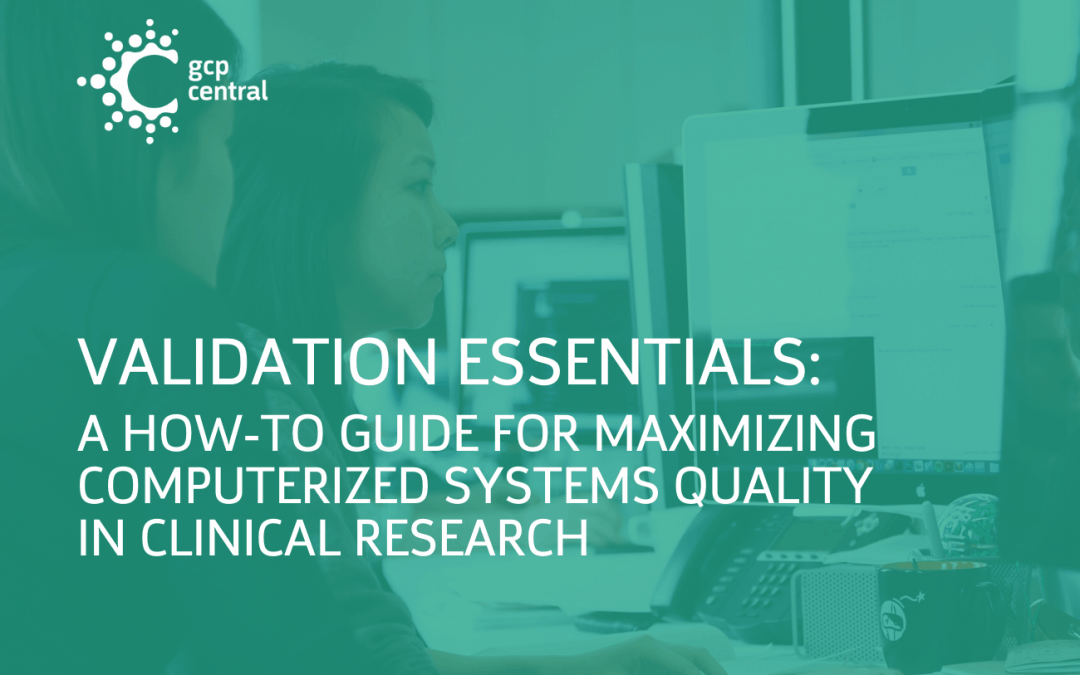This year, 336,905 clinical trials have been registered worldwide. The result of these studies is data, massive amounts of data, which are only credible and reliable when the conduct of the clinical trials is compliant with stringent regulations.
To ensure good quality clinical trials, validation of your own or your vendor’s system becomes critical. To support you with this process, GCP Central is proud to announce the release of its newest whitepaper: Validation Essentials: A How-To Guide For Maximizing Computerized Systems Quality In Clinical Research.
But why write a whitepaper on this topic? In this blog, we’ll divulge our motivations and share with you our insights.
Quality Management Systems
To ensure quality, both sponsors and investigators should set up quality management systems. These are often a combination of the Setup Of Procedures (SOPs), risk inventorization tools, preventive measure tools, and checks and controls during all stages of the trial and independent audits to verify the adherence to the quality management system.
These methods maintain and improve the quality of clinical trials and make sure the data and results are trustworthy. They lead to new therapies that are proven effective.
In almost all of the 336.905 clinical trials, at least one or more computerized systems will be used.
Biotech, CRO, and pharma companies use them in the setup and management of trials and sites use systems executing the trial. These range from Clinical Trial Management Systems (CTMS), Data Management Systems (CDMS), drug safety systems, laboratory information management systems (LIMS), electronic/remote data capture tools (EDC/RDC), Learning Management Systems (LMS) to devices enabling Patient-Reported Outcomes (ePRO), and wearables and apps that collect patient data.
From managing worldwide trials, finding and scheduling patients, gathering trial data, and analyzing trial results, these systems have broad uses. However, how is the quality of these systems ensured?
For software to be used in the conduct of clinical trials, it should be qualified for use and validated to verify if it meets regulatory and business requirements. So, how can validation of your own or your vendor’s system help to ensure good quality clinical trials?
What Is Validation?
The validation of software tools used in the conduct of clinical trials is a requirement described in the ICH-GCP guidelines, applicable to drug research globally, and implemented in local legislation, including the EU legal framework and the US Code of Federal Regulations (21 CFR Part 11 ).
How you can complete the validation process is not described in the regulations, but can it be found in guidance documents written by the EMA and FDA.
Why Is It Essential For Conducting Your Clinical Trials?
Clinical trials are using more and more software in their conduct.
However, the requirement for creating credible data hasn’t changed. When using software to create or manage clinical trial data, it should be transparent and traceable with an audit trail showing what the system does with the data entered:
- Where is it stored?
- Who entered it?
- When was it changed, and by whom?
- What kind of processes are run by the system, and what is the result?
A system used in clinical trials should operate consistently, which means that every similar system action from a user should result in a similar outcome. Validation is the way to give this transparency and proof. How does it do that?
In the validation process of a system, all requirements (including regulatory requirements) and the expected result are documented and verified by extensive testing. Both the conditions and the methods are recorded, providing proof that data generated by the system is completed consistently. This ensures the integrity, reliability, and robustness of the generated data.
What Benefits Are There To Validating Systems?
Besides meeting regulatory requirements, there are other reasons why you should validate the systems you use in clinical trials:
- It ensures the system is configured to your user requirements and meets your expectations
- It gives you traceability: each requirement and specification are traceable back to a test case
- It makes you audit and inspection ready 24/7 as your system automatically keeps your documentation trail up to date
Why Should You Validate Your Systems
Validation of your software is a critical component of your quality management system. Validation proves that the software or system used in your clinical trial meets regulatory requirements and specifications and fulfills its intended purpose.
Validation is a process that should not be underestimated. It takes time, expertise, and effort, and ensures that the quality expected from the used software meets the expectations.
At GCP Central, we validated myGCP, our learning management system built for use in clinical trials. As of April 30th, 2020, we are proud to announce that myGCP has been validated.
We have now written a whitepaper to support your validation process with our learnings and giving valuable insight into the process from our experience.
Are you setting out on your validation journey? Why not download our whitepaper “Validation Essentials: A How-To Guide For Maximizing Computerized Systems Quality In Clinical Research” and read our insights into the process.



